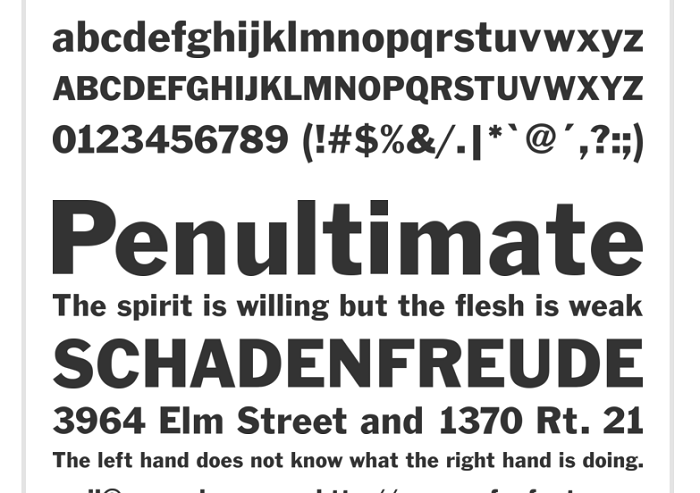Deciphering the Ink: A Journey into Newspaper Headline Fonts
Imagine unfolding a crisp newspaper, the ink still slightly fragrant. Your eyes, drawn to the bold pronouncements splashed across the top of the page, are engaging with a centuries-old tradition: the art of the newspaper headline. But what font choices underpin these declarations, these whispers and shouts of the world's happenings? What typeface carries the weight of current events, shaping our first impressions of the news itself?
The fonts used for newspaper headlines are more than just aesthetic choices; they are functional tools, designed to capture attention, convey information quickly, and establish a publication's distinct personality. From the bold, declarative serifs of traditional broadsheets to the more contemporary sans-serif choices of modern tabloids, the typography of headlines is a language in itself, whispering volumes about the publication's tone and target audience.
Historically, newspapers relied heavily on serif fonts for their headlines. Think of iconic typefaces like Times New Roman, Cheltenham, and Bodoni. These fonts, with their distinctive strokes and flourishes, were chosen for their perceived readability and classic appeal. However, as newspaper design evolved and printing technology advanced, the landscape of headline typography began to shift. The advent of digital publishing further broadened the possibilities, introducing a wider range of font choices and design flexibility.
The primary concern when selecting a headline font is readability. A headline must be instantly decipherable, even at a glance. Factors such as font weight, x-height, and letter spacing all play a crucial role in ensuring that the message is conveyed effectively. Balancing aesthetic appeal with legibility is a delicate art, requiring careful consideration of the target audience and the publication's overall design aesthetic.
Choosing the right headline font is a crucial step in establishing a newspaper's brand identity. The typeface acts as a visual cue, signaling the publication's tone and style. A serious, politically-focused newspaper might opt for a classic serif font, while a more sensationalist tabloid might choose a bolder, more dramatic typeface. The selected font sets the stage for the reader's experience, shaping their perception of the news before they even begin to read.
One common headline font is Cheltenham, often found in American newspapers. Its strong, slightly condensed form makes it ideal for capturing attention while remaining legible at various sizes. Another popular choice is Franklin Gothic, a sans-serif font frequently used for headlines due to its clean lines and modern appearance. Variations of these fonts, and others like them, fill the pages of newspapers around the world, each contributing to the unique identity of its publication.
Several benefits accrue from careful headline font selection. First, a well-chosen font enhances readability, making it easier for readers to quickly scan and understand the news. Second, the right font contributes significantly to a newspaper's brand identity, projecting a consistent image and style. Third, effective headline typography creates visual hierarchy, guiding the reader's eye through the page and highlighting the most important stories. For example, using a larger, bolder font for the main headline and progressively smaller fonts for subheadings creates a clear visual structure.
Advantages and Disadvantages of Common Headline Fonts
| Font | Advantages | Disadvantages |
|---|---|---|
| Cheltenham | Readable, classic, works well in various sizes | Can appear dated, less impactful in small sizes |
| Franklin Gothic | Clean, modern, versatile | Can lack personality, may not be suitable for all publications |
Frequently Asked Questions:
What font does the New York Times use for headlines? The New York Times primarily uses Cheltenham for headlines.
What are some good sans-serif fonts for headlines? Franklin Gothic, Helvetica, and Arial are popular choices.
Why are serif fonts traditionally used for headlines? Serifs are thought to improve readability in print.
How does font size affect headline readability? Larger sizes increase visibility, while smaller sizes require careful font selection.
What is kerning and why is it important for headlines? Kerning is the adjustment of space between letters, crucial for visual balance and readability.
How can I choose the best font for my newspaper's headlines? Consider your target audience, publication style, and readability factors.
Are web fonts suitable for online newspaper headlines? Yes, web fonts offer greater design flexibility and performance.
What are some common mistakes to avoid when choosing headline fonts? Using too many fonts, overly decorative fonts, and neglecting readability are common pitfalls.
In the ever-evolving world of news dissemination, the role of the headline remains paramount. The careful selection of a headline font, a seemingly small detail, holds significant weight in shaping the reader's experience and contributing to the publication's success. From the bold proclamations of breaking news to the subtle whispers of human interest stories, the font chosen is the vehicle for these narratives, carrying the weight of information and emotion. As we navigate the digital age, the principles of headline typography, rooted in tradition and constantly adapting to new technologies, continue to shape the way we consume and interpret the news. Therefore, understanding the nuances of headline font selection is crucial for any publication seeking to connect with its audience and leave a lasting impact. This mindful attention to typography ensures that the news, in all its forms, reaches its intended destination, clear, compelling, and impactful.
Dad ly delights conquer fathers day with diy gifts
Unlocking the power of the tiktok shop logo a transparent approach
Unlocking the secrets your ultimate guide to finding flexible ducting














